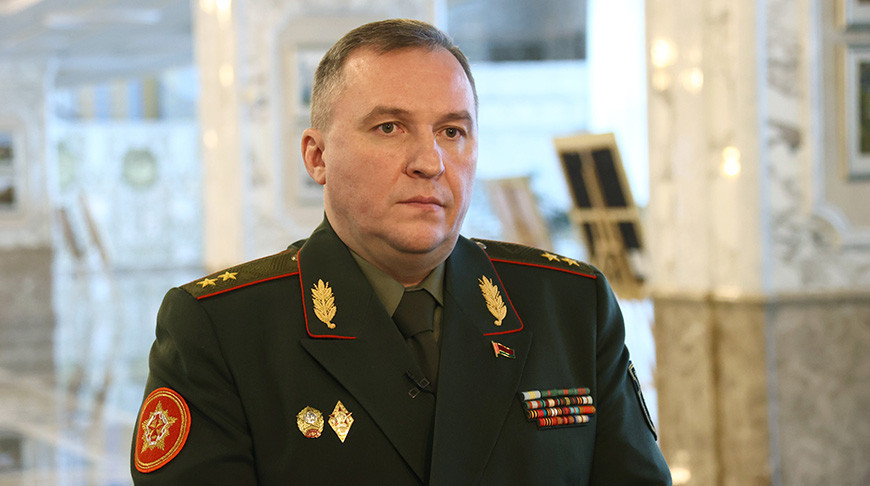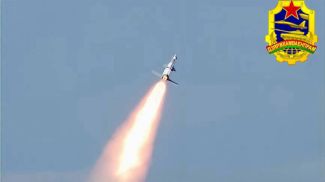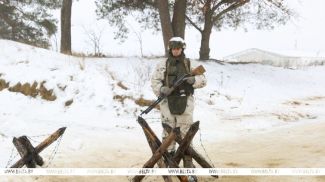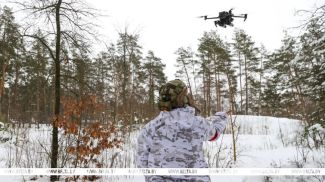
Viktor Khrenin
MINSK, 16 January (BelTA) – After a session of the Security Council Belarusian Defense Minister Viktor Khrenin talked to reporters and explained the main provisions of the new draft of Belarus’ Military Doctrine, BelTA has learned.
The defense minister primarily drew attention to the importance and significance of the Military Doctrine for the Belarusian state. “It is a fundamental document that reflects the main views of the state on peace and war, on using military force in response to existing challenges and threats,” he said.
In his words, the draft Military Doctrine takes into account changes of the situation and contains a number of novelties. But, on the whole, it preserves continuity and the main message about the peace-loving nature of the Belarusian nation. “We clearly underline and stipulate that Belarus does not consider a single nation as its enemy despite actions of their governments. It is the key message, the spirit of the Military Doctrine,” Viktor Khrenin stated.
Among important novelties the official mentioned clear identification of sources of military threats for Belarus. While military documents of NATO countries clearly name concrete countries as enemies, Belarus points out probable sources of threats. “We clearly identify sources of threats and what countries they originate from,” Viktor Khrenin explained.
He also drew attention to the stronger connection between the new edition of the Military Doctrine and the draft National Security Concept. “A lineup of threats to military security has been clearly formulated bearing in mind the existing challenges to military security,” the defense minister clarified. “Bearing it in mind, we formulated the measures the state is going to take in response to the emergence of risks, challenges, and threats. We have clearly formulated what actions government agencies are supposed to take and what functions they will perform. Within the framework of responding to possible threats to the military security of our country we have clearly identified and are trying to convey Belarus’ views on the use of the tactical nuclear weapons, which are deployed in our territory.”
The draft Military Doctrine has a new chapter that sketches out Belarus’ allied commitments. The authors drew upon Kazakhstan’s experience among other things. Kazakhstan has lived through an attempt at a coup d'etat.
The defense minister said that response mechanisms had been improved to reduce response times. “The new edition of the Military Doctrine no longer uses the old classification of military conflicts into regional ones, local ones, and other kinds. We have clearly determined that [a conflict] can be either interstate or between coalitions. In other words, we now classify them depending on the number of participants and clearly stipulate that Belarus can counteract threats on its own in an interstate conflict. Particularly a conflict involving neighboring countries. As far as responses are concerned, we divide threats into domestic ones and foreign ones,” he added. The sequence of actions the state will take in response to domestic threats for the sake of localizing them and blocking them has been clearly stipulated as well.
According to the defense minister, after the draft Military Doctrine was reviewed by the Security Council on 16 January, the document will be polished and will be submitted for approval of the Belarusian People’s Congress later on.
BelTA reported earlier that the decision to draft a new Military Doctrine was made after a new edition of the National Security Concept was approved in February 2023. The new Military Doctrine does not radically change provisions of the state military policy. The current provisions remain unchanged. The defensive nature of the military policy has been preserved.
The document is a public and open one. It is systemic, methodological, concrete and lives up to modern reality. At the same time it emphasizes national values such as peace, stability, and security.
The new Military Doctrine reveals the content of the country’s military policy. In particular, the document stresses that Belarus is a peace-loving country and threatens no one. But attempts to interfere with domestic affairs or threats to use military force or an aggression will be stopped by leveraging the entire potential of the state.













